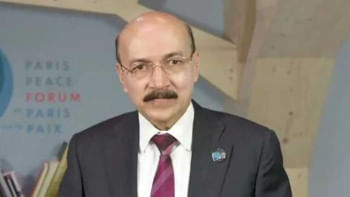'Investing in climate adaptation brings a much higher return'

Chief Executive Officer of the Global Center on Adaptation, Professor Dr Patrick Verkooijen, has said investing in climate adaptation is not just the right thing to do but is also the economically smart thing to do.
"Every dollar invested in climate adaptation brings a much higher return on investment," he said in an interview with UNB noting that Bangladesh is on the frontline of climate emergency.
Dr Patrick said addressing climate change is a national priority for the country, and Bangladesh is recognised internationally for its cutting-edge achievements in addressing climate change.
The activities of the Global Hub on Locally Led Adaptation (LLA) was launched on December 11 in Dhaka by Prime Minister Sheikh Hasina in an event reinforcing the government of Bangladesh's global leadership on LLA.
GCA's research has shown that a dollar invested in weather and climate information services gives between 4 and 25 dollars in benefits.
One dollar invested in resilient water and sanitation not only saves lives but it creates between two t and 12 dollars in economic benefits.
Dr Patrick said, "We are here to learn. When it comes to adaptation, our best teachers are often those who are on the frontlines of climate change. And few countries have more to teach us than Bangladesh," he said, adding that there is a lot other countries can learn from Bangladesh's approach.
He said Bangladesh is a "striking example" of how poor communities can be the most innovative in adapting to climate change. "We hope the valuable lessons it has learnt will help the rest of the world adapt to our new climate reality."
He said rising seas, floods, and intensifying cyclones are just a few of the impacts that make Bangladesh one of the most climate change-vulnerable countries in the world.
Average tropical cyclones cost Bangladesh about $1 billion annually. From 2000 to 2019, Bangladesh suffered economic losses worth $3.72 billion and witnessed 185 extreme weather events due to climate change.
By 2050, Dr Patrick said, a third of agricultural GDP could be lost and 13 million people could become internal climate migrants. In case of a severe flooding, like we have just seen in Pakistan, GDP could fall by as much as nine percent.
Asked why locally led adaptation is so important, Dr Patrick said, "The reason LLA is so important is that you can't make top-down national plans without investing in enabling bottom-up inputs from the vulnerable communities so that the plans are implemented without failure."
Dr Patrick mentioned that with the combined expertise and financial resources of the Global Hub, they can urgently and cost-effectively find ways to help and support those local communities most disrupted by climate change. "We can help them adapt, survive and thrive."
About the long-term plans for this Global Hub on LLA, Dr Patrick said the GCA Global Hub on LLA will have a deliberate focus on the local level, targeting the adaptation-related knowledge and information needs of local communities, governments, practitioners, and other grassroots organisations and champions.
It will then expand outwards to encompass the LLA-specific needs of other actors that play a critical role in enabling and empowering LLA, he said.
In the first phase of its activities between 2022-2025, Dr Patrick said, the Global Hub on Locally Led Adaptation will focus its work on accelerating locally led adaptation across Africa and Asia.


 For all latest news, follow The Daily Star's Google News channel.
For all latest news, follow The Daily Star's Google News channel. 



Comments